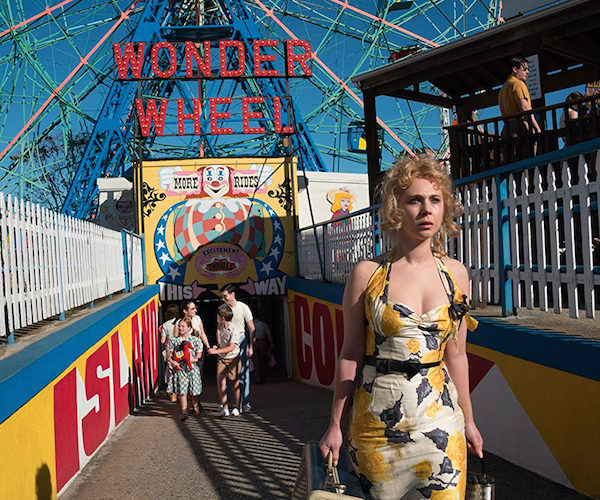Film Review: The Ever-present Nostalgia of Woody Allen
If you can accept yet another tour around a love triangle, Wonder Wheel is generally engaging and nearly always entertaining.
Wonder Wheel, directed by Woody Allen. Screening at West Newton Cinema and other movie houses around New England.

Juno Temple in a scene from “Wonder Wheel.”
By Paul Dervis
Woody Allen has built the second half of his career longing for the past, albeit a caricature. Last year’s Cafe Society and 2011’s Midnight in Paris are testaments to the fact. Of course, the past has been a recurring hankering throughout his tenure as one of America’s leading writer/directors. Heck, he brought us Radio Days, Broadway Danny Rose, and way back in 1972, Play it Again, Sam.
But Wonder Wheel goes a step further than simple homage ; this time around he’s definitively gone “all in” on glorifying the past…or more specifically…his past.
It is the repressed Eisenhower ’50s. It is a Coney Island populated by artists and actors and carnival barkers. The line-up of cartoon characters is aimed at soliciting sentimental feelings for a long gone era in an aging audience. (God knows what millennials will make of it all.)
And it almost works, at least for the right demographic.
The film’s narrative voice is Mickey, a college student, lifeguard, wannabe playwright, and all-around scoundrel. Imagine a good looking Allen in his early twenties. Mickey is biding his time, making a little dough on the Brooklyn beach between semesters. He encounters Ginny, a waitress at a clam shack at Coney Island. Ginny is pushing forty, a former actress; she is stuck in a loveless marriage to Humpty, a carousel operator at the amusement park. Humpty is okay, as long as he doesn’t get a couple of shots of whiskey in him. Then Carolina, Humpty’s estranged daughter, comes into the picture. She was a good kid who made the mistake of falling for a gangster and now, after squealing on him to the Feds, is on the lam.
Get the melodramatic picture?
Anyway, miserable Ginny falls for Mickey and they start up a sleazy affair. Their trysts take place under the boardwalks at the beach and Mickey is happy with the torrid arrangement, at least for the summer. That is, until he chances upon Carolina.
You can see where this is going, right?
However, if you can accept yet another tour around a love triangle, Wonder Wheel is generally engaging and nearly always entertaining. The stylized goings-on amount to a stab at New York Neo-Realism; Allen blends verisimilitude and over-the-topness with authority. If only his entire cast did the same.
To be fair, the young actors manage to juxtapose styles with confidence. Justin Timberlake, who gave a fine performance in The Social Network, improves on his earlier work here. His Mickey is smooth as silk, yet also oozes an innocence that transforms what could have been a ‘very bad young man’ into an appealing protagonist. He woos viewers with a flashy smile, his easy-going demeanor, and his down-right boyishness.
Juno Temple, as Carolina, has much less to work with than the more established cast members, but she does more with it. She is in the fewest scenes of all the principals, but leaves a lasting impression. Her character, much like Mickey’s, is not conventionally sweet, but her portrait undercuts the astringency. We feel for her. We like her…and most importantly, we root for her.
Kate Winslet has received critical kudos for her performance as Ginny. But that is not my conclusion. To me, she takes turns at seriously chewing the scenery with moments of collapsing into a deadly stone face. Where is there any nuance? Worse, she seemed to have considerable difficulty walking Allen’s tightrope between reality and fantasy … and that is a skill the role demands.
And Jim Belushi, as Humpty, does little more than flail about. The generally mediocre actor does nothing but supply a resolutely superficial facade.
One of the major characters in Allen’s tale is Coney Island itself; he knows just how to portray the gritty land of glitter, and as a director he knows how to film it in its best gaudy light. Visually, the movie was quite stark, yet beautiful. The look was welcoming enough to make one want to go back in time, and really, wasn’t that the point? As Rod Stewart sang, “You wear it well/ A little old fashioned but that’s all right.”
Paul Dervis has been teaching drama in Canada at Algonquin College as well as the theatre conservatory Ottawa School of Speech & Drama for the past 15 years.
